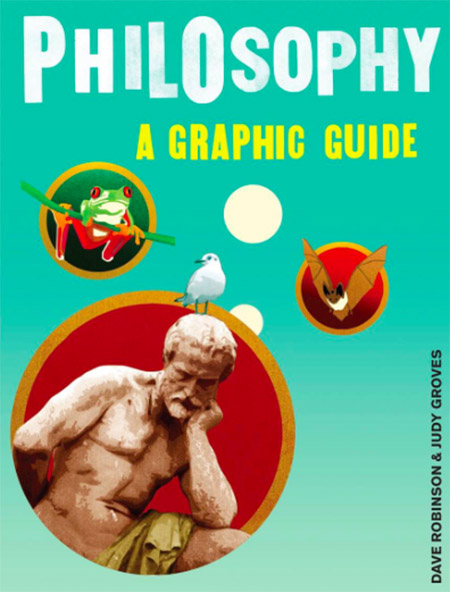Going to the source

Not the original source material. Image: Book cover “Introducing Philosophy: A Graphic Guide,” by Dave Robinson and Judy Groves
The publication of an annotated edition of Adolf Hitler’s Mein Mampf (My Struggle) has been much in the news lately. It’s the first time the book has been in print in Germany since the Second World War, and much ink has been spilled over whether that’s a good or bad thing, and what it all means. But of all that has been written about the publication, it was this comment by an NCPR listener that appeared yesterday on a Fresh Air interview with the author of a book on Hitler’s early days that struck me:
Inveterate NCPR commenter Pete Klein said: “If I were to read Mein Kampf, I would read it without bothering to read the annotations. Why? Because you would lose the flavor of the intent. Annotations are a way of one person using another persons’ words to express their own ideas. They can argue they are only correcting errors but their true intent is to put forward their own ideas.”
Among all of you who read these words, I may be the only person who has read Mein Kampf, in translation but without annotation, when I was a teenager. Pete’s comment perfectly captures my motivation. It was then the 1960s and as a student, I felt that I was looking at the world through the filter of everyone else’s eyes. My views on politics, history, religion, existence itself, were mediated by the redigestion of difficult, challenging, thick books by popularizers and opinion leaders of the day.
This is even truer today, when many of us do so much of our reading from Internet sources. Often, big complicated ideas get boiled down to a few misleading context-free bullet points that are then used as cudgels to pound in a particular point of view.
Back then, as an antidote, I not only read Hitler’s book, I read translations of Mao’s Little Red Book, Marx’s Das Kapital, Kropotkin’s Revolutionary Pamphlets and I also read The Federalist Papers. When my interests turned toward religion, I read a translation of the New Testament all the way through for the first time, and a translation of the Koran, and the Bhagavad Gita, and the Twelve Deeds of Buddha, and the Diamond and Lotus Sutras.
Ok, so I got a little carried away; I was young. But my point is this–if you want to really understand something, the closer you can get to the source, the better.
Part of the reason our conversations around big ideas are so uncivil and polarized these days, is that we have had those big ideas reduced to absurd cartoon versions of themselves by others who have overt or covert agendas to advance.
Every now and then, it’s a good idea to thumb off the tablet, go to the library, and crack open something thick and musty. Facebook will still be there when you get done.
Tags: listeningpost








Amen!
Totally in agreement with the final three paragraphs of your post, Dale. Thank you for saying it so well. Unfortunately, the people I know (and know of) who most need to pay attention to that are the ones least likely to read it.